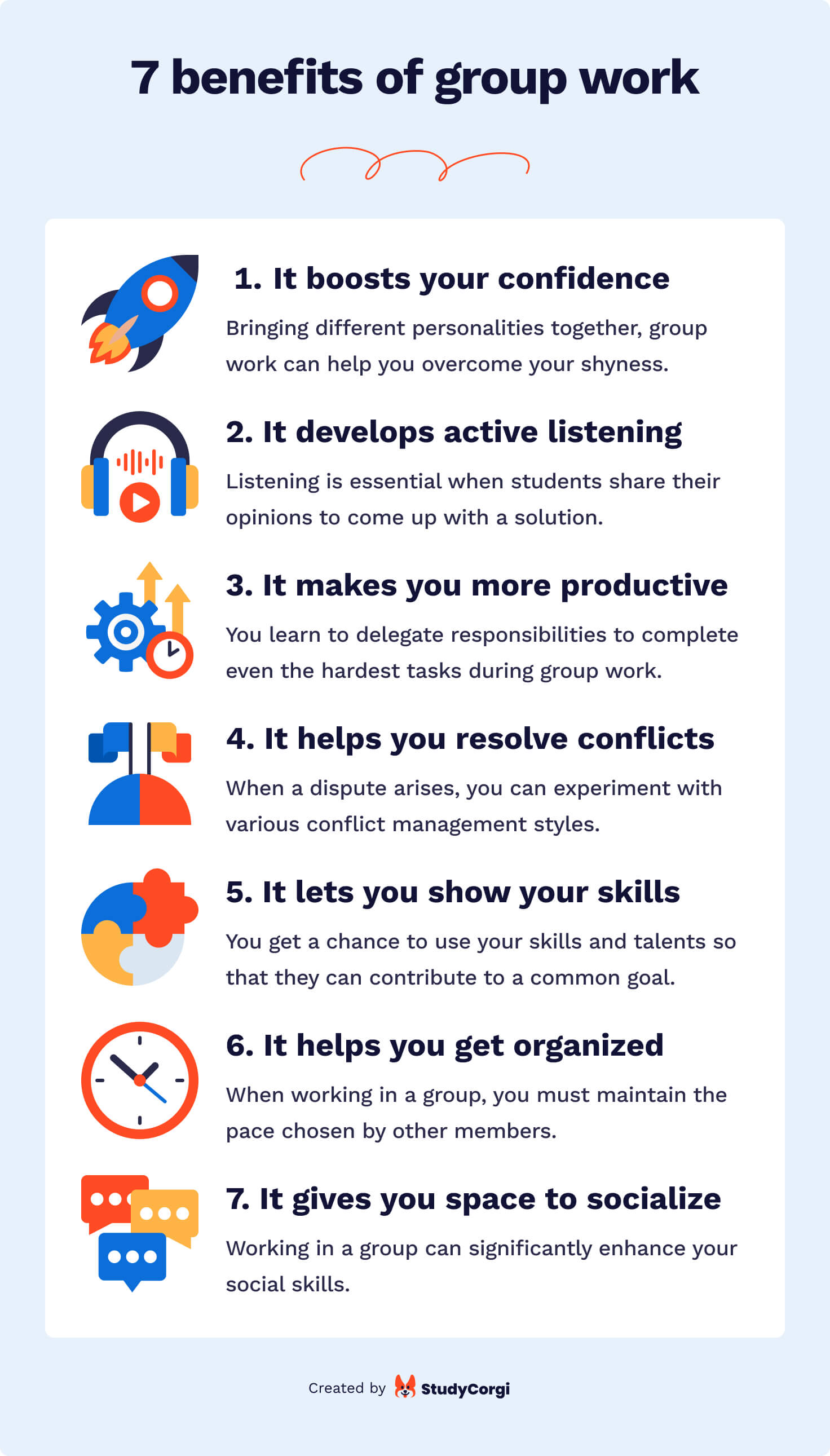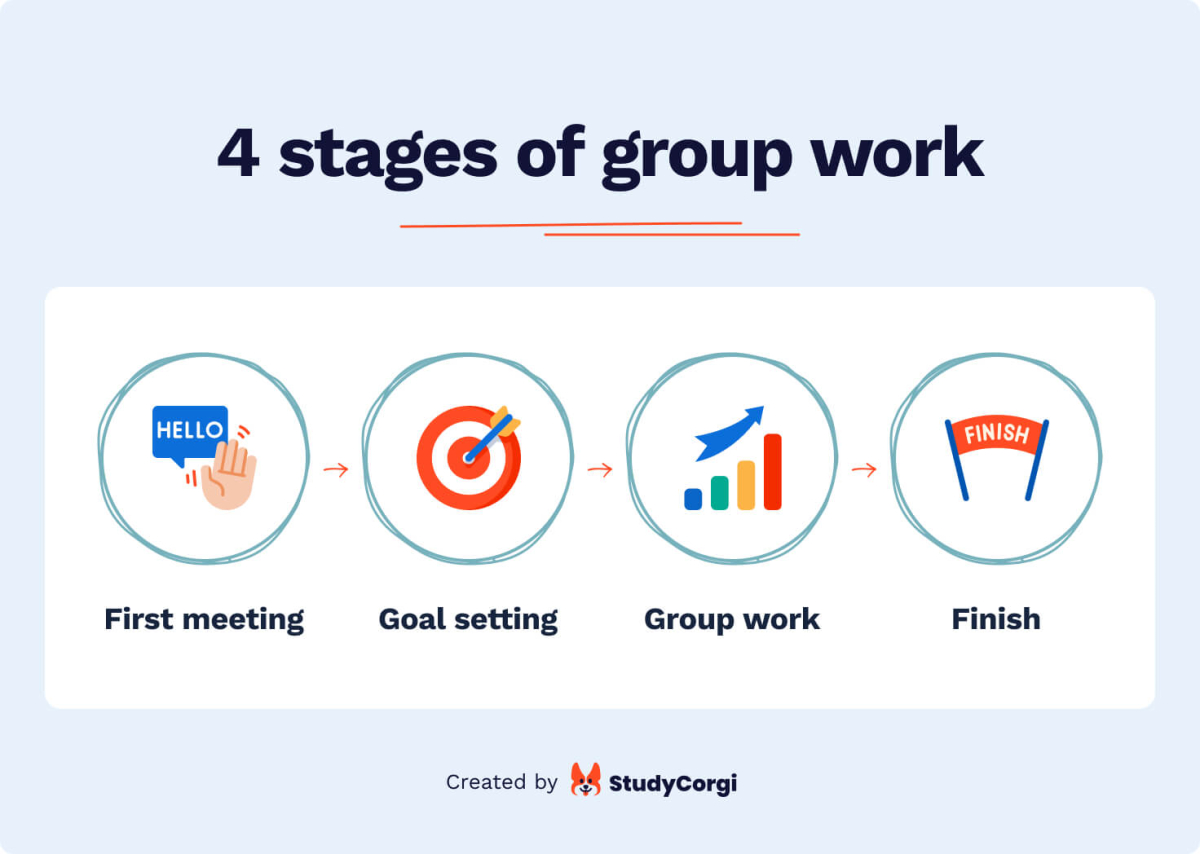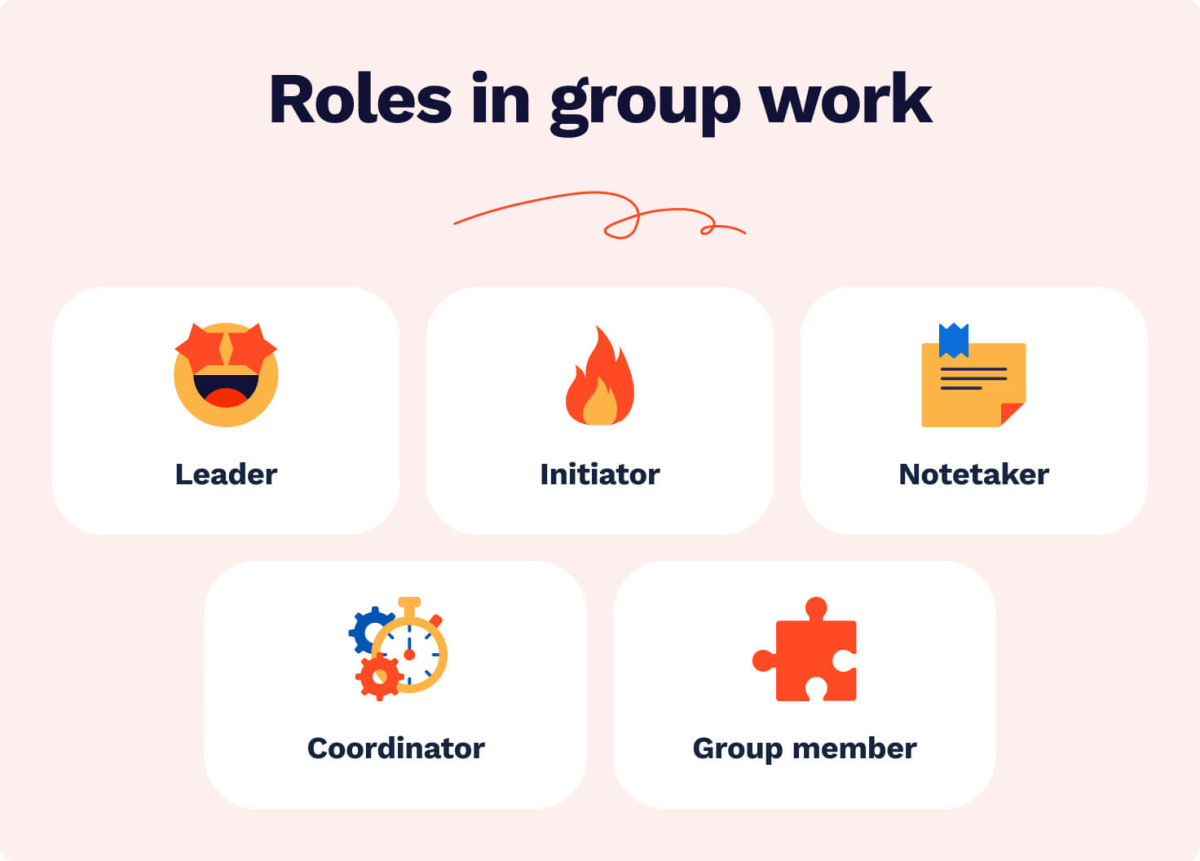Do you avoid group work because you feel like you always work harder than the other members? Perhaps you’re not sure how to split tasks fairly or establish healthy communication?

Despite the challenges, group activities significantly contribute to students’ skills, like planning, time management, communication, etc. This article written by our experts will discuss:
- what makes group work effective;
- how to have the best experience while collaborating with others.
Let’s dive in!
🤔 Group Work – What It Is, Who Needs It, & Why
Group work is very common in high school and college. However, not everyone understands the value behind group activities or how to participate in them successfully. Let’s look at the phenomenon of group work and its key features!
What Is Group Work?
Group work is a collaborative action in which participants work together to solve problems and complete assignments.
Group work boosts students’ teamwork skills by encouraging them to delegate responsibilities and share knowledge.
When working in a group, you should:
- Focus on the accomplishment of a common goal.
- Share roles and responsibilities among group members.
- Communicate effectively to achieve goals.
- Provide clear directions for every group member.
- Accept mutual responsibility as individuals and as a group.
Note that group work and teamwork are NOT the same things. During group work, members have more individual accountability. In contrast, teamwork requires the participants to cooperate more intensively.
However, both team and group work allow for the freedom to focus on individual tasks and responsibilities.
Why Do Teachers Make Us Work in Groups?
Did you know that group work is an essential tool for effective learning? Many teachers assign group activities requiring students to share their ideas openly. This can benefit students in two different ways.
- Motivation. Group work motivates students to think about their own ideas carefully and learn how to explain them to others. This enhances students’ self-awareness and critical thinking.
- Expanding one’s worldview. Group work can expand a student’s worldview by making them consider the thoughts and ideas of others.
Group work teaches students essential communication and social skills, for example, active listening and effective speaking. Students learn to delegate responsibilities and function as a cohesive unit while working in a group. The interpersonal lessons learned through group work can significantly benefit a student’s future career.
What Are the Benefits of Group Work?
The significance of group work cannot be underestimated. Having enough experience with group activities at school and college gives a student many future advantages.

Consider these key benefits of group work:
- Boosts your confidence. Since group work brings different personalities together, it can help you overcome your shyness and self-doubt.
- Helps you master active listening. Listening is essential during group work when students constantly share their opinions to come up with a solution.
- Improves your productivity. You learn to delegate responsibilities to complete even the most challenging tasks during group work.
- Assists with conflict resolution. When a dispute during group work arises, you are allowed to experiment with various conflict management styles.
- Lets you show off your skills. During group work, you get a chance to use your skills and talents so that they can contribute to a common goal.
- Improves your time-management skills. When working in a group, you must maintain the pace chosen by other members.
- Gives you space to socialize. Working in a group can significantly enhance your social skills. Without communication, you wouldn’t be able to complete a group task.
🤝🏽 What Is Effective Group Work?
The ability to work with others is an advantage in both the academic and professional worlds. Thus, learning how to participate in group work activities is essential. Consider these guidelines:
- Group members respect each other’s time. To achieve the best results possible, all group members should stick to the schedule and deadlines that have been agreed upon.
- Responsibilities are clear for everyone. Effective group work is all about knowing what you and other students in a group need to do.
- A group has a leader. Appointing a leader is essential since this person will delegate tasks, collect feedback and mediate conflicts if they arise.
- Communication is open and transparent. By sharing their knowledge and experience, group members increase their chances of finding the best solution.
- Group members acknowledge their strengths. Self-awareness is essential when it comes to group work. Ideally, every group member should be responsible for the task they are the best at.
What Are the Key Principles of Group Work?
Organization and planning are the two fundamental principles of efficient group work. To reach a common goal, a group needs to have deadlines every member agrees on and a transparent distribution of member roles. Finally, supporting each other and being ready to help is vital for successful group work.
Stages of Group Work
Effective group work can be divided into 4 stages. Review them below to easily navigate the next opportunity you have to work in a group.

- Getting familiar with the group mates.
When you first meet with your group, spend some time getting to know each other. Discuss each other’s key academic interests, skills, and experience. This information will be beneficial when delegating tasks. If there’s a creative person in your group, they can be responsible for creating the presentation or other visuals. - Making a plan and setting goals.
It is crucial to assign a group leader who can communicate what needs to be done and who will be responsible for different tasks. The best strategy is to delegate responsibilities according to group mates’ strengths, making the most out of their abilities and talents. - Accomplishing the tasks.
For members to work on their tasks efficiently, it is vital to schedule regular meetings. During group gatherings, you can track their progress, discuss challenges, and motivate each other. If some issues arise, but there’s no upcoming meeting, it is helpful to have a group chat for instant communication. - Completing the group work.
This final part requires a lot of attention to detail because this is when the group ties up loose ends. At the end of group work, students usually need to write a report to showcase their results. It is crucial to demonstrate every group member’s contribution.
Roles and Responsibilities in Group Work
For group work to be efficient, every member needs to understand their role and responsibilities. Below we’ll discuss what roles are essential for effective communication within a group.

- Leader. The role of the group leader is very administrative and includes setting goals and distributing responsibilities. Besides that, a leader schedules the meetings, manages the discussions, and mitigates conflicts if they arise.
- Initiator. Initiators are the ones responsible for generating ideas and suggestions. Their key function is to gather information that can be useful for completing the task. Students in the initiator role tend to be vocal and proactive when sharing their opinion.
- Notetaker. A notetaker is a person responsible for recording the meetings. Notetakers keep track of essential points members make, as well as updates, changes, and decisions.
- Coordinator. Coordinators bring group members together to help them efficiently collaborate on common goals. Their key function is to determine how different group members can complement each other’s strengths and weaknesses.
- Group member. Being an effective group member requires a person to participate in every meeting and take their tasks seriously. Often group members have to take on other roles and responsibilities if it is needed of them.
✅ Challenges of Group Work & Their Solutions
Various challenges may arise during group work. Knowing what issues to anticipate is essential so that you can solve them with your group. Here are the most common challenges of group work and how to overcome them.
- Challenge #1: Coordinating schedules.
- More information: Finding time for regular group meetings can be difficult for students with busy schedules and those who live off campus.
- Solution: Ensure that every group member clearly understands what they need to do. This way, even if they miss a meeting, the results will not be affected dramatically. Try arranging meetings in a mixed format, where some members can participate online by Zoom or Google Meet.
- Challenge #2: Unequal distribution of responsibilities.
- More information: Some members may contribute less to group work because of laziness or lack of knowledge or skills. No matter the reason, this situation can lead to a severe conflict.
- Solution: Make sure that everyone is responsible for the task they are good at. If a person is not participating, the group should try to find out why without being confrontational.
- Challenge #3: Lack of motivation.
- More information: Without a person responsible for organizational tasks, a group might fail to create a timetable, establish goals, and meet deadlines.
- Solution: Assign a group moderator during the first meeting to avoid a situation in which the whole group works on the project the night before the deadline.
- Challenge #4: Personal issues.
- More information: When personal conflicts happen, group members start to argue and speak over each other constantly.
- Solution: Maintaining mutual respect within a group is essential to prevent personal conflicts. Every member should know that their opinion matters. If you cannot reach an agreement during a meeting, take a break until the next gathering.
- Challenge #5: Missing deadlines.
- More information: Missing deadlines is a common problem during group work. Unpredictable things happen all the time, like a group member getting ill, for example.
- Solution: To help a group meet its deadlines, discuss each member’s progress during the meetings. Regular discussions will indicate if someone needs help with their tasks, and other members can back them up.
🏆 10 Tips for Successful Group Work
Group work is an excellent opportunity to share your knowledge and experience with fellow students. Consider these tips to ensure you have the best experience when participating in group activities.
- Spend enough time getting to know your group members, their academic interests, and past experiences.
- Always call your group members by their names to create a trusting atmosphere.
- Only set deadlines that every group member agrees on.
- Choose the group role where you can best apply your skills and talents.
- Whenever a conflict arises, avoid being confrontational and simply take a pause until the next meeting.
- Listen carefully to others because their ideas can significantly contribute to the group’s performance.
- Initiate conversations about the group climate and whether members feel any tension.
- Don’t hesitate to ask questions to clarify others’ ideas and suggestions.
- Ask your group members for feedback and integrate their suggestions to improve your participation.
- Share your enthusiasm with other group members and celebrate every tiny victory you have together.
Conclusion
Participating in group activities can help you as a student to develop vital communication and collaboration skills and prepare you for academic and professional success. Even if your teacher doesn’t offer group projects, you can still organize group work to learn new material or prepare for exams.
Many challenges may arise during group work, like a lack of free time or organization. However, when you learn to overcome these problems, you begin the journey to success and self-growth.
Remember that group work creates a unique environment where you can share your knowledge and experience with like-minded people, acquire new skills, and uncover your hidden talents. Don’t miss out on the opportunities to participate in group activities and become the best version of yourself while also possibly creating life-long bonds!
